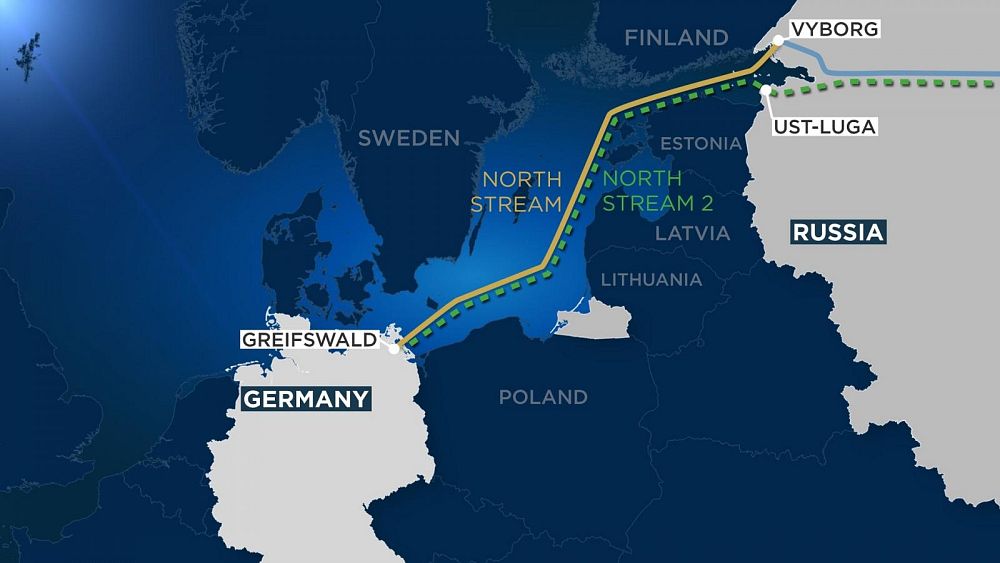It has been five years since a consortium of energy companies agreed in the summer of 2015 to build a second pipeline route to carry gas from Russia to Germany under the Baltic Sea.
Construction on the Nord Stream 2 route is very nearly complete — 94% of it is ready, by some accounts — but disquiet is rising among politicians and activists in Europe and the United States, and some believe the gas may never actually flow.
Few are now objecting on environmental grounds, even though green activists warn burning more fossil fuels will only contribute to the climate emergency.
Its supporters say the pipeline is entirely a commercial venture to send an additional 55 billion cubic metres to European markets.
Yet the bulk of the opposition is political: more and more voices believe Europe should be depending less on Russian energy, not more.
“It is totally against the European Union’s aim of being more self-sufficient and less dependent on Russian energy,” said Henna Virkkunen, a Finnish MEP who has long opposed the pipeline.
The chances that the project could be cancelled wholescale now stand at “fifty-fifty”, added Anders Åslund, a Swedish economist and senior fellow at the Atlantic Council think-tank.
Regional opposition
“If you broadly look at it there are only four countries that are in favour Nord Stream 2, and that’s Germany, Austria, Holland and Belgium. France is not in favour, it’s sort of indifferent,” he told Euronews, claiming that even countries along whose Baltic sea bed the pipeline runs are essentially opposed to its construction.
“Sweden is basically against but can’t find a legal reason to be against. Denmark is of course against.”
Before making landfall Nord Stream 2 skirts the shorelines of Finland, Sweden and the Danish island of Bornholm, and required approval from all three countries.
Virkkunen, the Finnish MEP, said the debate in Finland had been largely over the environmental impact, with little political discussion.
There was more of a debate in Denmark, whose approval was the last to come through: the country’s energy agency allowed Russian ships just two months ago to begin laying parts of the pipeline around Bornholm.
Pressure on Germany
But it is the German government where pressure is mounting to find a way to pull out of the venture, especially since last month’s poisoning of Russian opposition figure Alexei Navalny and his arrival in a Berlin hospital for treatment.
Heiko Maas, the German foreign minister, was quoted by Bild earlier this month as saying he hopped Russia “do not force us to change our position on Nord Stream”.
A cacophony of views has emerged from politicians in the region.
Last Tuesday, Austria’s president, Alexander Van der Bellen, insisted he saw no connection between Nord Stream 2 and the Navalny poisoning.
Two days later, the European Parliament used a resolution criticising Russia over the Navalny case to reiterate its earlier call to halt Nord Stream 2 entirely.
On Thursday members of Lithuania’s parliament called on Germany to abandon the project entirely.
The United States, which would prefer Germany opted instead for American natural gas, is another powerful factor. It introduced sanctions last year that forced a delay in Nord Stream 2’s construction and Congress has threatened more action against the five consortium companies.
It triggered a frenzied round of lobbying according to the newspaper Die Zeit, which revealed last week that German Finance Minister Olaf Scholz lobbied his US counterpart Steven Mnuchin in August, offering to finance two German gas terminals for American use in exchange for the US dropping its objections to Nord Stream 2.
‘Not connected’ to Navalny
For Virkkunnen, cancelling the pipeline would be a difficult decision to take but necessary for energy dependency.
But as far as Russia is concerned, the Navalny incident has no bearing and the project should not be “politicised”.
“This is a commercial project that is absolutely in line with the interests of both Russia and European Union countries, and primarily Germany,” Kremlin spokesman Dmitry Peskov told reporters on a conference call last week.
Åslund predicted mounting domestic opposition within Germany’s governing party would be a factor in Chancellor Angela Merkel saying “enough is enough, that Nord Stream 2 is not in the European interest.”
When approached by Euronews, the German Finance Ministry declined to comment on whether the government was preparing to cancel Nord Stream 2.
A spokesman said it was “in contact with the US government regarding the issue of sanctions” and the pipeline.








